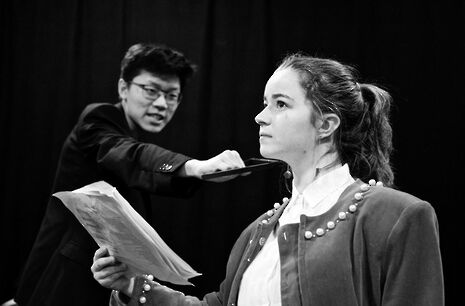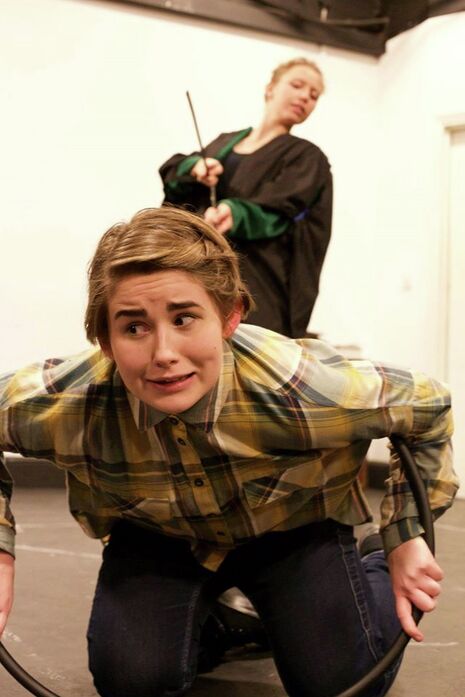Review: Blame Not Our Author
Sian Bradshaw found herself grappling with this ambitious but ultimately impenetrable translation

As I left the Corpus Playroom this evening, I asked my friend what he thought of Blame Not Our Author. He told me that it was “probably the most ‘Cambridge’ thing” he had ever seen. Given that this play revolves primarily around anthropomorphised shapes and is laden with both Latin phraseology and geometrical puns, I’d say he wasn’t at all wrong.
Blame Not Our Author is a 17th century comedy, never before performed and penned in the English Jesuit College, that envisages mathematical figures inhabiting the two-dimensional space of a Euclidian textbook. It is in this bizarre and perplexing geometrical world that Quadro, a self-professed melancholic, wishes that he was instead the perfect circle. Meanwhile his cunning friend, Rectangulum, seeks to throw the shape-world into complete disarray by turning the other shapes against their creator, the Compass.
Granted, this is a highly ambitious play that posits an interesting premise, but at its core it was esoteric and almost impenetrable. It is clear that directors, Ben Martineau and Fran Hughes, are passionate about the text and have made good work out of ‘shaping’ a compact and polished script from an otherwise incredibly obscure work, and this is a joy to see. But it is this obscurity that ultimately makes the play much harder to engage with.
“Blame Not our Author is more likely to incite an appreciative raise of an eyebrow, or a courteous chuckle”
Billed as a surrealist antidote to the pressures of Cambridge life, it is difficult to comprehend that theatre-goers in pursuit of an hour of good old light-hearted fun would want to read the Brief Historic Notes on the Play that were scattered among seats. While I can appreciate how this de-mystifies the play, it is something I’d be more likely to expect on a desk in Lecture Block Room 6 before a Monday morning lecture on Renaissance theatre than at the Corpus Playroom, where I rather more expect an all too fleeting hour of escapism, away from the perils of secondary texts and bibliographies.
The humour throughout the play is learned rather than laugh-out-loud, relying heavily on wordplay and puns and, as a result, there are no real belly laughs. Blame Not our Author is more likely to incite an appreciative raise of an eyebrow, or a courteous chuckle.

Lisa Bernhardt's set was more appropriately scant, with heavily chalked, blackboard-esque floor reflecting the play’s heavy emphasis on geometrical learning in a Jesuit-influenced curriculum, while the shadows cast on the walls by shapes cascading from the ceiling proved to be visually appealing. However, there were some issues with projection, and I spent much of the performance distracted by the all too familiar glow of a MacBook display shone on the wall, worrying that the laptop battery was about to run out before the play finished.
But there were some good performances, and Elise Hagan in particular was wonderfully Machiavellian as Rectangulus, delivering her monologues with a cunning ease and showing a knack for comic timing as she laughed maniacally to the ominous music, amid transient flashes crimson light.
Olly Francis gave an equally rousing performance as Quadro, leaping around the stage frenetically and lamenting her quadratic nature, but more generally throughout the play, jokes often exceeded their delivery, and at times, actors stumbled over the latinate pronunciation, while diction could be poor. I would put this down largely to a case of opening night jitters for a busy cast, and it will hopefully be something that improves throughout the run.
“It is a witty, academical play and the decision to enact such a little-known piece is one that should be both admired and encouraged”
But these issues seem to emphasise once more the inaccessible nature of the play. If actors have difficulty even pronouncing their lines (and understandably so – they read like tongue twisters), then how are we expected to grapple with them?
All in all, the play was an ambitious evening of theatre that confronted pertinent and familiar issues of melancholy and identity crisis, but still managed to be rather out of touch with its audience. Ultimately, it is a witty, academical play and the decision to enact such a little-known piece is one that should be both admired and encouraged. But if you’re looking for an evening of unadulterated fun, then Blame Not Our Author seems like too much hard work
 News / SU reluctantly registers controversial women’s soc18 December 2025
News / SU reluctantly registers controversial women’s soc18 December 2025 News / CUP announces funding scheme for under-represented academics19 December 2025
News / CUP announces funding scheme for under-represented academics19 December 2025 News / Cambridge welcomes UK rejoining the Erasmus scheme20 December 2025
News / Cambridge welcomes UK rejoining the Erasmus scheme20 December 2025 Features / Should I stay or should I go? Cambridge students and alumni reflect on how their memories stay with them15 December 2025
Features / Should I stay or should I go? Cambridge students and alumni reflect on how their memories stay with them15 December 2025 Film & TV / Timothée Chalamet and the era-fication of film marketing21 December 2025
Film & TV / Timothée Chalamet and the era-fication of film marketing21 December 2025









